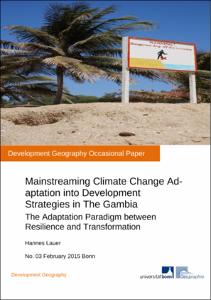Lauer, Hannes: Mainstreaming Climate Change Ad-aptation into Development Strategies in The Gambia : The Adaptation Paradigm between Resilience and Transformation. Bonn: Department of Geography, University of Bonn, 2015. In: Development Geography Occasional Paper, 03.
Online-Ausgabe in bonndoc: https://hdl.handle.net/20.500.11811/8579
Online-Ausgabe in bonndoc: https://hdl.handle.net/20.500.11811/8579
@techreport{handle:20.500.11811/8579,
author = {{Hannes Lauer}},
title = {Mainstreaming Climate Change Ad-aptation into Development Strategies in The Gambia : The Adaptation Paradigm between Resilience and Transformation},
publisher = {Department of Geography, University of Bonn},
year = 2015,
month = feb,
series = {Development Geography Occasional Paper},
volume = 03,
note = {Climate change adaptation (CCA) has emerged as a new paradigm of development politics. But as adaptation has turned out to be not as tangible as mitigation, controversies about the meaning and implementation have arisen parallel to the concept’s ascent. Experience about political CCA interventions is rare, due to the fact that the major changes are supposed to occur in the future and have uncertain outcomes. The question of how to avoid being passive and rather being proactive in this unknown territory is shaping the discourse of the contested political arena of adaptation and discusses the relationship between adaptation and development. Even though there is evidence that adaptation is linked to processes of societal transformation and development, these linkages pose challenges to scientists and decision makers alike, especially because adaptation has the same target group - the most vulnerable people in the most vulnerable countries. Critical voices increasingly warn that adaptation might be misunderstood, misused and integrated into business as usual development frameworks.
During a research in The Gambia the ongoing process of mainstreaming CCA into development strategies was followed. Analysing the policy documents, conducting (expert)interviews and working with the leading national environment authority of the country provided a practical way of understanding the mainstreaming process and its linkages to other processes. These insights are discussed in view of the possible future pathway of adaptation. Hereby, the concepts of resilience and transformation serve as central framework.
The study concludes that there is a lot of actionism noticeable on the political scale which offers windows for transformative processes. Many of these chances are, however, not seized due to a tangle of countryintern and extern factors. Nevertheless some pragmatic but simultaneously creative approaches from the Gambian climate change network might provide some adaptation and development cobenefits.},
url = {https://hdl.handle.net/20.500.11811/8579}
}
author = {{Hannes Lauer}},
title = {Mainstreaming Climate Change Ad-aptation into Development Strategies in The Gambia : The Adaptation Paradigm between Resilience and Transformation},
publisher = {Department of Geography, University of Bonn},
year = 2015,
month = feb,
series = {Development Geography Occasional Paper},
volume = 03,
note = {Climate change adaptation (CCA) has emerged as a new paradigm of development politics. But as adaptation has turned out to be not as tangible as mitigation, controversies about the meaning and implementation have arisen parallel to the concept’s ascent. Experience about political CCA interventions is rare, due to the fact that the major changes are supposed to occur in the future and have uncertain outcomes. The question of how to avoid being passive and rather being proactive in this unknown territory is shaping the discourse of the contested political arena of adaptation and discusses the relationship between adaptation and development. Even though there is evidence that adaptation is linked to processes of societal transformation and development, these linkages pose challenges to scientists and decision makers alike, especially because adaptation has the same target group - the most vulnerable people in the most vulnerable countries. Critical voices increasingly warn that adaptation might be misunderstood, misused and integrated into business as usual development frameworks.
During a research in The Gambia the ongoing process of mainstreaming CCA into development strategies was followed. Analysing the policy documents, conducting (expert)interviews and working with the leading national environment authority of the country provided a practical way of understanding the mainstreaming process and its linkages to other processes. These insights are discussed in view of the possible future pathway of adaptation. Hereby, the concepts of resilience and transformation serve as central framework.
The study concludes that there is a lot of actionism noticeable on the political scale which offers windows for transformative processes. Many of these chances are, however, not seized due to a tangle of countryintern and extern factors. Nevertheless some pragmatic but simultaneously creative approaches from the Gambian climate change network might provide some adaptation and development cobenefits.},
url = {https://hdl.handle.net/20.500.11811/8579}
}






